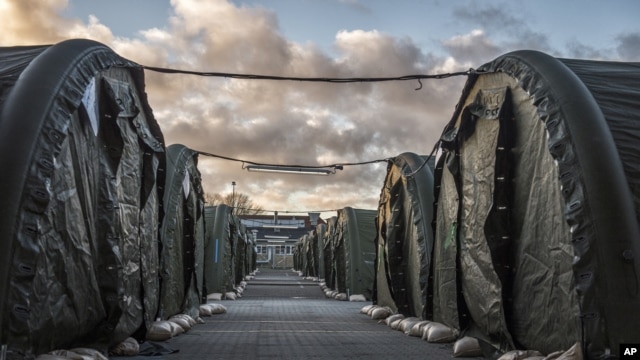
The Danish parliament has backed a controversial proposal to confiscate asylum seekers' valuables to pay for their upkeep.
Police will be able to seize valuables worth more than 10,000 kroner (1,340 euros; £1,000) from refugees to cover housing and food costs.MPs also approved plans to delay family reunions for asylum seekers.A spokesman for UN chief Ban Ki-moon criticised the decision, saying refugees deserved compassion."People who have suffered tremendously, who have escaped war and conflict, who've literally walked hundreds of kilometres if not more and put their lives at risk by crossing the Mediterranean should be treated with compassion and respect, and within their full rights as refugees," said Stephane Dujarric.The bill has been widely criticised by human rights groups.

The new measures also mean the period migrants will have to wait before applying for relatives to join them will be extended from one year to three - a move aimed at discouraging new arrivals.
Temporary residence permits will be shortened and the conditions for obtaining a permanent permit will be restricted.
Denmark received more than 21,000 asylum seekers in 2015.
MPs approved the measures by 81 votes to 27 following a lengthy, and at times angry, debate. One MP abstained and 70 others were absent. The centre-left opposition Social Democrats and the anti-immigration Danish People's Party both voted in favour.
Martin Henriksen, immigration spokesman for the Danish People's Party, described the numbers of migrants entering Europe as an "exodus".
"More needs to be done. We need more border controls, we need tighter immigration rules," he said.
But Johanne Schmidt-Nielsen, of the opposition left Red-Green Alliance that opposed the bill, said it was "a symbolic move to scare people away".
Prime Minister Lars Lokke Rasmussen of the centre-right Venstre party had previously shrugged off criticism of the proposals calling them "the most misunderstood bill in Denmark's history".


The new measures also mean the period migrants will have to wait before applying for relatives to join them will be extended from one year to three - a move aimed at discouraging new arrivals.
Temporary residence permits will be shortened and the conditions for obtaining a permanent permit will be restricted.
Denmark received more than 21,000 asylum seekers in 2015.
MPs approved the measures by 81 votes to 27 following a lengthy, and at times angry, debate. One MP abstained and 70 others were absent. The centre-left opposition Social Democrats and the anti-immigration Danish People's Party both voted in favour.
Martin Henriksen, immigration spokesman for the Danish People's Party, described the numbers of migrants entering Europe as an "exodus".
"More needs to be done. We need more border controls, we need tighter immigration rules," he said.
But Johanne Schmidt-Nielsen, of the opposition left Red-Green Alliance that opposed the bill, said it was "a symbolic move to scare people away".
Prime Minister Lars Lokke Rasmussen of the centre-right Venstre party had previously shrugged off criticism of the proposals calling them "the most misunderstood bill in Denmark's history".
No comments:
Post a Comment